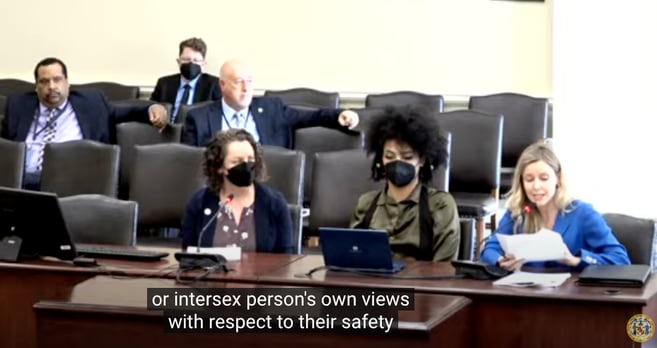
Advocates for the rights of transgender prisoners speak during a Public Safety and Administration Subcommittee hearing on Feb. 21, 2024. From left to right: Alice Wilkerson, executive director of Advance Maryland; Jamie Grace Alexander of the Trans Rights Advocacy Coalition; and Heather Warnken, executive director of the Center for Criminal Justice Reform at the University of Baltimore School of Law.
The Maryland Department of Correctional Services says transgender prisoners are ‘housed according to physical genitalia.’ Advocates say that’s illegal.
Nearly a year after formerly incarcerated transgender people testified to Maryland lawmakers about the troubling conditions they faced in state prisons and Baltimore jails, the agency in charge of their care continues to violate federal standards in how it houses trans prisoners, according to a coalition of trans rights advocates.
The Trans Rights Advocacy Coalition, bolstered by policy experts and attorneys, contends that while the Maryland Department of Public Safety and Correctional Services has made some strides towards improving conditions, its policy of housing transgender prisoners “according to physical genitalia” violates the federal standard that those individuals should be housed on a case-by-case basis determined by health and safety and any security problems, among other factors. The group laid out its argument in a 15-page memo presented to the department and lawmakers this week.
The corrections department has in the past maintained that it is in compliance with federal standards. The agency did not immediately respond to a request for comment on the group’s response to its report on Wednesday.
The number of transgender prisoners increased slightly in the last fiscal year, but still represents only a fraction of the overall population of incarcerated people — some 78 individuals out of roughly 15,425 prisoners.
And yet the complexities of housing transgender prisoners have proven vexing for the corrections department, which has faced numerous lawsuits in recent years, including one brought by Chelsea Gilliam, who alleged she was sexually assaulted and isolated in Baltimore jails and has since been joined by other plaintiffs.
The corrections department last year escaped legislation that would have overhauled its policies on intake, housing, transfers and discrimination. The Maryland Transgender Respect, Agency, and Dignity Act, originally modeled after a California law passed in 2020 that allows trans people to be housed and searched in a manner consistent with their gender identity, failed to make it out of committee last year.
But advocates gained a small victory in budgetary language requiring the corrections department to provide more data on trans prisoners — a requirement the department has not yet fully complied with, advocates said Wednesday.
Better data could better quantify how many trans prisoners are in the system, a total an advocate estimates could be as high as 400 people. It would also spotlight how often those individuals end up in restricted housing and for how long, a major source of concern.
Trans people face an outsized risk of being sexually assaulted while incarcerated, according to the U.S. Department of Justice, adding urgency to efforts to reform corrections department policies.
The raw emotion of the testimony last year remains fresh in the minds of advocates who found the department’s subsequent response, a 29-page November 2023 report titled “Treatment of Transgender Incarcerated Individuals” underwhelming and even harmful.
“The report states that ‘the only complaint expressed by the transgender population is with commissary items not being available,’” the Trans Rights Advocacy Coalition noted in its response to the report. “This assertion lands as deeply out of touch, especially for those who have experienced recent trauma within DPSCS, listened to the harrowing testimony from directly impacted individuals recounting horrific violence and rights violations during the effort to pass” the Maryland Transgender Respect, Agency, and Dignity Act.
DPSCS declined immediate comment, saying it’s working on a response but did not have it yet.
This story may be updated.



